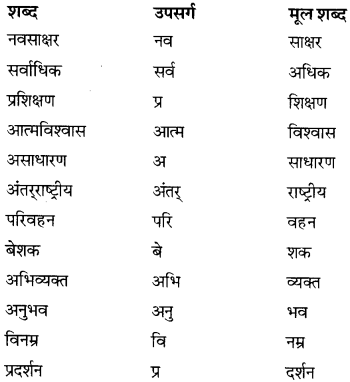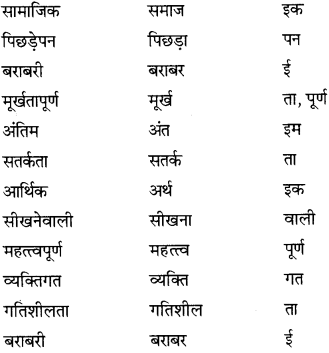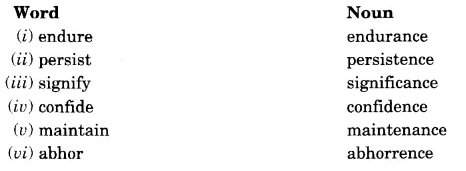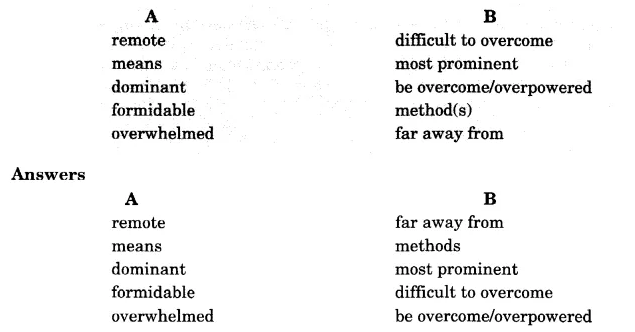NCERT Solutions for Class 8 Hindi Vasant Chapter 7 क्या निराश हुआ जाए are part of NCERT Solutions for Class 8 Hindi. Here we have given NCERT Solutions for Class 8 Hindi Vasant Chapter 7 क्या निराश हुआ जाए.
| Board | CBSE |
| Textbook | NCERT |
| Class | Class 8 |
| Subject | Hindi Vasant |
| Chapter | Chapter 7 |
| Chapter Name | क्या निराश हुआ जाए |
| Number of Questions Solved | 13 |
| Category | NCERT Solutions |
NCERT Solutions for Class 8 Hindi Vasant Chapter 7 क्या निराश हुआ जाए
प्रश्न-अभ्यास
(पाठ्यपुस्तक से)
आपके विचार से
प्रश्न 1. लेखक ने स्वीकार किया है कि लोगों ने उन्हें भी धोखा दिया है फिर भी वह निराश नहीं हैआपके विचार से इस बात का क्या कारण हो सकता है?
उत्तर :
लेखक द्वारा इस तथ्य को स्वीकार करने के बाद भी कि उसने लोगों से धोखा खाया है, फिर भी वह निराश नहीं है, क्योंकि
(क) लेखक जीवन के प्रति आशावादी दृष्टिकोण रखने वाला व्यक्ति है
(ख) वह ठगे जाने या धोखा खाने जैसी घटनाओं का बहुत कम हिसाब रखता है
(ग) उसके हाथ छल-कपट जैसी घटनाएँ हुई हैं, पर विश्वासघात नहीं या बहुत कम हुआ है
(घ) लेखक के साथ ऐसी बहुत-सी घटनाएँ हुई हैं जब लोगों ने अकारण ही उसकी मदद की है
प्रश्न 2. समाचार-पत्रों, पत्रिकाओं और टेलीविज़न पर आपने ऐसी अनेक घटनाएँ देखी-सुनी होंगी जिनमें लोगों ने बिना किसी लालच के दूसरों की सहायता की हो या ईमानदारी से काम किया होऐसे समाचार तथा लेख एकत्रित करें और कम-से-कम दो घटनाओं पर अपनी टिप्पणी लिखें।
उत्तर :
ऐसे दो समाचार जिसमें ईमानदारी तथा बिना लालच के दूसरों के लिए काम किया गया है
1. अड़चनें भी डिगा नहीं पाईं शिक्षिका का हौसला-सहयोगियों का मिला भरपूर सहयोग(नोएडा) जहाँ एक ओर शिक्षा का व्यापार करके लोग रात-दिन अपनी जेब भरने में व्यस्त हैं, वहीं कुछ लोग ऐसे भी हैं जो तमाम अड़चनों के बावजूद मानसिक व शारीरिक रूप से असहाय बच्चों की सेवा करते हुए उनके जीवन में ज्ञान की रोशनी फैला रहे हैंऐसी ही शिक्षिका हैंसलारपुर स्थित बचपन डे केयर की सीमा पांडे।
दिसंबर, 2006 में लखनऊ निदेशालय, विकलांग विभाग की ओर से स्थापित बचपन डे केयर में सीमा ने बतौर शिक्षिका काम शुरू किया थाउस समय वहां एक कोआर्डिनेटर और दो अन्य शिक्षिकाएँ भी कार्यरत थीं लेकिन वर्ष 2007 से फंड की कमी और लखनऊ निदेशालय की ओर से सेंटर को बंद किए जाने के आदेश के बाद धीरे-धीरे अन्य स्टाफ नौकरी छोड़ गया सीमा ने हिम्मत नहीं हारी, मानसिक व शारीरिक रूप से अक्षम बच्चों के हक को लेकर वे विभागीय अधिकारियों के सामने भी डटकर खड़ी हो गईंतब से वे अकेले ही शिक्षिका व प्रभारी का कार्य संभालते हुए 25 से अधिक बच्चों के जीवन में ज्ञान की ज्योति जला रही हैंयह सीमा और उनके सहयोगियों का साहस ही था कि उनके निरंतर प्रयास से विभाग के डायरेक्टर ए.के. बरनवाल ने 2008-09 तक सेंटर चलाने की लिखित अनुमति दे दीसीमा बताती हैंकि डायरेक्टर के आदेश के आधार पर उन्होंने बैंक में जमा फंड में से सेंटर और वाहन के किराए का भुगतान कर दिया लेकिन कुछ विभागीय अधिकारीफंड होते हुए भी बच्चों पर खर्च किए जाने वाली राशि के आवंटन में रोड़े अटका रहे हैंअब अधिकारियों ने सेंटर बंद कराने का नया दाँव खेला हैपिछले सात महीने से पूरे स्टाफ की तनख्वाह यह कहकर रोकी हुई है कि जो पैसा सेंटर और वाहन के किराए में खर्च हुआ है उसके बदले में तनख्वाह काटी जा रही है।
इसके बावजूद सीमा सहित अन्य स्टाफ पूरी निष्ठा के साथ बच्चों की देखभाल में व्यस्त हैंसीमा का कहना है कि इन बच्चों को पढ़ाने और इनकी देखभाल करने से एक अलग सुकून मिलता है और जितना हो सकेगा, मैं इन बच्चों के लिए प्रयास करूंगी
2. गरीब बच्चों के लिए समर्पित जीवन – नोएडा के सेक्टर-12 में पिछले 19 वर्षों से एक महिला शिक्षक अनाथ व गरीब बच्चों को मुफ्त शिक्षा दे रही हैशिक्षा देने वाली इस महिला ने बच्चों की खातिर अपना घर तक नहीं बसायाहर साल यहाँ पर आने वाले अनाथ बच्चों को साक्षर बनाना उनके जीवन का उद्देश्य बन गया है।
शिक्षक होने के बावजूद भी उनके प्रेम, लगाव और व्यवहार की वजह से ही बच्चे उन्हें ‘माँ’ कहते हैं37 अनाथ बच्चों के इस बसेरे को बसाने वाली और बच्चों को शिक्षा दे रहीं अंजना राजगोपाल ने अभी तक शादी नहीं कीयह प्रेरणा औरों के लिए भी काम कर गई।
आज गरीब और बेसहारा के लिए साईं कृपा की ओर से सेक्टर-41 और सेक्टर-135 में स्कूल चलाया जा रहा है, जिसमें आने वाले सभी 18 शिक्षक बिना किसी पारिश्रमिक के बच्चों को पढ़ा रहे हैंहिंदुस्तान दैनिक 05 सितंबर 2009 दिल्ली संस्करण टिप्पणी-(समाचार 1 हेतु)
इस समाचार को पढ़कर हमारे मन में उन बच्चों की शिक्षा के प्रति जागरूकता उत्पन्न होती है जो किसी कारण से स्कूल नहीं जा पा रहे हैंहमें उनकी शिक्षा हेतु सार्थक कदम ‘विद्यादान महादान’ वाली कहावत चरितार्थ करना चाहिए
टिप्पणी – (समाचार नं 2 हेतु)-इस समाचार पत्र को पढ़कर अंजना राजगोपाल का त्याग एवं समर्पण के प्रति मन श्रद्धानत हो जाता हैहमें भी इस तरह के कार्य करने के लिए आगे आना चाहिए।
प्रश्न 3. लेखक ने अपने जीवन की दो घटनाओं में रेलवे टिकट बाबू और बस कंडक्टर की अच्छाई और ईमानदारी की बात बताई हैआप भी अपने या अपने किसी परिचित के साथ हुई किसी घटना के बारे में बताइए जिसमें किसी ने बिना किसी स्वार्थ के भलाई, ईमानदारी और अच्छाई के कार्य किए हों
उत्तर :
आज समाचार-पत्रों में नकारात्मक घटनाओं-हिंसा, लूट, मार-पीट आदि की घटनाओं को प्रमुखता से तथा बढ़ा-चढ़ाकर प्रस्तुत किया जाता हैइन समाचार-पत्रों में किसी की नि:स्वार्थ भलाई करने की घटनाएँ कभी-कभी ही छपती हैंऐसा नहीं कि समाज में ऐसी घटनाएँ घटती ही नहीं हैऐसी घटनाएँ होती तो हैं, पर वे यदा-कदा ही प्रकाश में आ पाती हैंऐसी ही एक घटना का वर्णन मैं कर रहा हूँ जो सत्य है तथा मेरे आसपास से ही जुड़ी है।
प्रतिभा कब, कहाँ, किस रूप में पैदा हो जाती है, इसका अनुमान लगाना कठिन हैमेरे पिताजी के एक मित्र हैं जो खेती करके अपना गुजारा मुश्किल
से कर पाते हैंउनका बड़ा बेटा शुरू से ही पढ़ाई में बड़ा होनहार हैदसवीं में उसने 90% से अधिक अंक प्राप्त किएग्यारहवीं में विज्ञान विषय से अपनी पढ़ाई शुरू कर दीविज्ञान की पढ़ाई खेती के सहारे पूरी करा पाना संभव न था, फिर भी जैसे-तैसे तथा छात्रवृत्तियों के सहारे उसने बारहवीं की परीक्षा 92% अंकों से उत्तीर्ण कीआई.आई.टी.की परीक्षा के लिए उसने फार्म भर दिया थाउसका चयन भी हो गया, पर उसके पिताजी आई.आई.टी. की फीस देने में सर्वथा असमर्थ थेबच्चे के भविष्य का सवाल थामेरे पिताजी ने अपने एक एन.आर.आई. मित्र से फोन पर इस बारे में बात कीसारी बातें जानकर उन्होंने आई.आई.टी.का सारा खर्च उठाने की जिम्मेदारी लेते हुए एक लाख रुपये पिताजी के पास भेज दिये, जिसे लेकर पिताजी उसका प्रवेश दिलाने चले गएसंयोग की बात है कि उसका साढे चार साल का पाठ्यक्रम पूरा होने से पहले ही अमरीका की एक कंपनी ने अच्छा वेतन देते हुए उसका चयन कर लियाआज वह सॉफ्टवेयर इंजीनियर है किंतु अपने घरवालों के साथ पिताजी और उनके मित्र के इस भलाई के कार्य हेतु कृतज्ञतापूर्वक याद करता है।
पर्दाफ़ाश
प्रश्न 1. दोषों का पर्दाफाश करना कब बुरा रूप ले सकता है?
उत्तर :
दोषों का पर्दाफ़ाश करना तब बुरा रूप ले लेता है जब उसका उद्देश्य केवल आलोचना करते हुए मजाक उड़ाना ही रह गया होइस पर्दाफ़ाश के पीछे किसी के दोष को सुधारने का उद्देश्य न होकर उसकी बदनामी कराना होइसके अलावा इस पर्दाफ़ाश के पीछे किसी की भलाई का लक्ष्य न हो, किसी संस्था या प्रतिष्ठान को बदनाम करना हो, सत्यता को बिना जाने-समझे लोगों के सामने लाना, अपनी निजी वैमनस्यता या बदला लेने की भावना हो तथा स्वयं की महत्त्वाकांक्षा की पूर्ति करने की इच्छा हो तथा अपने चैनल आदि की प्रसिधि बढ़ानी हो
प्रश्न 2. आजकल के बहुत से समाचार पत्र या समाचार चैनल ‘दोषों का पर्दाफाश कर रहे हैंइस प्रकार के समाचारों और कार्यक्रमों की सार्थकता पर तर्क सहित विचार लिखिए?
उत्तर :
आजकल बहुत से समाचार पत्र या समाचार चैनल दोषों का पर्दाफाश कर रहे हैंइस तरह के कार्यक्रमों की सार्थकता है क्योंकि इनको पढ़कर या देखकर व्यक्ति जागरूक हो जाएँवे अपराधियों या दोषियों से बच सकें तथा अपने आसपास घटनाओं की पुनरावृत्ति न होने देंइन कार्यक्रमों की सार्थकता तभी है जब इन पर्दाफाश करने वाले कार्यक्रमों के पीछे सच्चाई, ईमानदारी तथा जनकल्याण की भावना छिपी होयदि इनके पीछे स्वार्थ, धनोपार्जन या चैनलों की प्रसिधि बढ़ाने की लालसा छिपी हो तो इन कार्यक्रमों की कोई सार्थकता नहीं है।
कारण बताइए
प्रश्न 1. निम्नलिखित के संभावित परिणाम क्या-क्या हो सकते हैं? आपस में चर्चा कीजिए, जैसे – “ईमानदारी को मूर्खता का पर्याय समझा जाने लगा है।” परिणाम-भ्रष्टाचार बढ़ेगा
- “सच्चाई केवल भीरु और बेबस लोगों के हिस्से पड़ी है।” ………………..
- “झूठ और फरेब का रोज़गार करनेवाले फल-फूल रहे हैं।” ………………..
- “हर आदमी दोषी अधिक दिख रहा है, गुणी कम।” ………………..
उत्तर :
- परिणाम-लोगों की सच्चाई में आस्था नहीं रह जाएगीचारों ओर झूठ का बोलबाला होगा
- परिणाम-ईमानदारी लुप्त होती जाएगी तथा भ्रष्टाचार बढ़ेगा
- परिणाम-लोग एक-दूसरे पर विश्वास नहीं करेंगेसच्चे व्यक्ति पर भी विश्वास करना कठिन हो जाएगा
दो लेखक और बस यात्रा।
आपने इस लेख में एक बस की यात्रा के बारे में पढ़ाइससे पहले भी आप एक बस यात्रा के बारे में पढ़ चुके हैंयदि दोनों बस-यात्राओं के लेखक आपस में मिलते तो एक-दूसरे को कौन-कौन सी बातें बताते? अपनी कल्पना से उनकी बातचीत लिखिए
उत्तर :
दो लेखक और बस यात्रा-इससे पहले पाठ में लेखक हरिशंकर परसाई द्वारा अपनी बस यात्रा का वर्णन किया गया हैजिसमें बस खराब होने के कारण वे समय पर गंतव्य तक पहुँचने की आशा छोड़ देते हैंइस पाठ में लेखक यात्रा करते हुए कुछ नया एवं अलग अनुभव करता हैये दोनों लेखक जब मिलते तो कुछ इस तरह बातचीत करते
हरि – नमस्कार भाई हजारी, कहो कैसे हो?
हजारी – नमस्कार मैं तो ठीक हूँ, पर तुम अपनी सुनाओकुछ सुस्त से दिखाई दे रहे होक्या बात है?
हरि – भाई क्या बताऊँ, परसों मैंने ऐसी बस से यात्रा की जिसे मैं जिंदगी भर नहीं भूलूंगाउसकी थकान अब तक नहीं उतरी है
हजारी – क्या उस बस में सामान रखने की जगह नहीं थी या सामान ज्यादा था जिसे लेकर तुम बैठे रहे?
हरि – यार मेरे पास सामान तो था ही नहींवह बस बिल्कुल टूटी-फूटी, खटारा थीवह किसी बुढ़िया जैसी कमजोर तथा जर्जर हो रही थी
हजारी – टूटी-फूटी बस से थकान कैसी? तुम तो सीट पर बैठे थे न
हरि – मैं तो सीट पर बैठा था पर जब बस स्टार्ट हुई और चलने लगी तो पूरी बस बुरी तरह हिल रही थीलगता था कि हम इंजन पर बैठे हैंबस का खिड़कियों के काँच टूटे थेजो बचे थे वे भी गिरकर यात्रियों को चोटिल कर सकते थेमैं तो खिड़की से दूर बैठ गयाआठ-दस मील चलते ही हम टूटी सीटों के अंदर थेपता नहीं लग रहा था कि हम सीट पर हैं या सीटें हमारे ऊपर
हजारी – क्या तुम अपने गंतव्य पर समय से पहुँच गए थे?
हरि – ऐसी बस से भला समय पर गंतव्य तक कैसे पहुँचा जा सकता हैबस रास्ते में दसों बार खराब हुईउसकी लाइट भी खराब हो गई थीमैंने तो यह सोच लिया था कि जिंदगी ही इसी बस में बीत जाएगीमैंने तो गंतव्य पर पहुँचने की आशा छोड़कर आराम से मित्रों के साथ गपशप करने लगातुम अपनी सुनाओ बड़े खुश दिखाई दे रहे हो क्या बात है?
हजारी – मित्र मैंने भी तो कल बस की यात्रा की थी, और मेरी भी यात्री अविस्मरणीय है, पर तुम्हारी यात्रा से अलग है
हरि – कैसे?
हजारी – मैं बस में अपनी पत्नी तथा बच्चों के साथ यात्रा कर रहा था कि एक सुनसान जगह पर हमारी बस खराब हो गई
हरि – सुनसान जगह पर क्या बस को लुटेरों ने लूट लिया?
हजारी – नहीं हमारे बस का कंडक्टर एक साइकिल लेकर चलता बना
हरि – चलता बनी कहाँ चला गया वह? कहीं वह लुटेरों से तो नहीं मिलाथा?
हजारी – मित्र सभी यात्री ऐसा ही सोच रहे थेकुछ नौजवानों ने ड्राइवर को अलग ले जाकर बंधक बना लिया कि यदि लुटेरे आते हैं तो पहले इसे ही मार दें
हरि – फिर क्या हुआ? क्या लुटरे आ गए?
हजारी – नहीं लुटरे तो नहीं आए, पर कंडक्टर दूसरी बस लेकर आयासाथ में मेरे बच्चों के लिए दूध और पानी भी लायाउस बस से हम सभी बारह बजे से पहले ही बस अड्डे पहुँच गए
हरि – बहुत अच्छा कंडक्टर था वह तोऐसे कंडक्टर कम ही मिलते हैंपर उस ड्राइवर का क्या हुआ?
हजारी – हम सभी ने कंडक्टर को धन्यवाद दिया और ड्राइवर से माफी माँगीहमने उसे समझने में भूल कर दी थी
हरि – मित्र हम सभी इंसान हैंजाने-अनजाने में हमसे भी गलतियाँ हो जाती हैंहमें सभी को अविश्वास की दृष्टि से नहीं देखना चाहिए
हजारी – मित्र यह हमारा दोष नहीं हैसमाज में गिरते मानवीय मूल्यों का परिणाम है यहहर किसी को अविश्वास की दृष्टि से देखा जाने लगा है
हरि – अच्छा, अब मैं चलता हूँफिर मिलेंगे, नमस्कार।
हजारी – नमस्कार
सार्थक शीर्षक
प्रश्न 1. लेखक ने लेख का शीर्षक ‘क्या निराश हुआ जाए’ क्यों रखा होगा? क्या आप इससे भी बेहतर शीर्षक सुझा सकते हैं?
उत्तर :
लेखक ने इस लेख का शीर्षक क्या निराश हुआ जाए’ इसलिए रखा होगा क्योंकि आज हिंसा, भ्रष्टाचार, तस्करी, चोरी, डकैती, घटते मानवीय मूल्य से जो माहौल बन गया है उसमें आदमी का निराश होना स्वाभाविक हैऐसे माहौल में भी लेखक निराश नहीं है, तथा वह चाहता है कि दूसरे भी निराश न हों, इसलिए उनसे ही पूछना चाहता है कि क्या निराश हुआ जाए? अर्थात् निराश होने की आवश्यकता नहीं हैइसका अन्य शीर्षक ‘होगा नया सवेरा’, या, “बनो आशावादी’ भी हो सकता
प्रश्न 2. यदि ‘क्या निराश हुआ जाए’ के बाद कोई विराम चिह्न लगाने के लिए कहा जाए तो आप दिए चिह्नों में से कौन-सा चिह्न लगाएँगे? अपने चुनाव का कारण भी बताइए।-,?.;-, …।
उत्तर :
‘क्या निराश हुआ जाए’ के बाद मैं प्रश्नवाचक चिह्न (?) लगाऊँगा क्योंकि लेखक समाज से ही पूछना चाहता है कि क्या निराश का वातावरण पूरी तरह बन गया हैयदि लोगों का जवाब हाँ होगा तो वह उन्हें निराशा त्यागने की सलाह देगा।
प्रश्न 3. “आदर्शों की बातें करना तो बहुत आसान है पर उन पर चलना बहुत कठिन है।” क्या आप इस बात से सहमत हैं? तर्क सहित उत्तर दीजिए।
उत्तर :
आदर्शों की बातें करना तो बहुत आसान है पर उन पर चलना बहुत ही कठिन है। इस बात से मैं पूर्णतया सहमत हूँ। जैसे हम कहते हैं कि ईमानदारी सबसे अच्छी नीति है। आखिर कितने लोग इसका पालन करते हैं? जरा सा अधिकार मिलते ही व्यक्ति भाई-भतीजावाद या ‘अंधा बांटे रेवड़ी पुनि-पुनि अपने को देय’ की नीति अपनाने लगते हैं। हाँ, जिनके हाथ में कुछ नहीं होता। वे ईमानदारी का राग जरूर अलापते हैं। वास्तव में ईमानदारी का पालन करते समय हमारी स्वार्थपूर्ण मनोवृत्ति सामने या आड़े आ जाती है।
सपनों का भारत
“हमारे महान मनीषियों के सपनों का भारत है और रहेगा।”
प्रश्न 1. आपके विचार से हमारे महान विद्वानों ने किस तरह के भारत के सपने देखे थे? लिखिए।
उत्तर :
मेरे विचार में हमारे मनीषियों ने उस भारत का सपना देखा था, जिसमें हिंदू, मुस्लिम, सिख, ईसाई, बौद्ध, जैन आदि विभिन्न धर्मों एवं मतों को मानने वाले मिलजुलकर रहें। उनके बीच आपसी सौहार्द्र हो। वे एक दूसरे से भाईचारा, प्रेम तथा बंधुत्व बनाए रखें। भारत प्राचीन काल में विश्व के लिए आदर्श था, वह भविष्य में भी अपना आदर्श रूप बनाए रखे। लोग भारतीय संस्कृति की विशेषताओं को अपनाएँ तथा इसे बनाए रखें।
प्रश्न 2. आपके सपनों का भारत कैसा होना चाहिए? लिखिए।
उत्तर :
‘मैं चाहता हूँ कि मेरे सपनों के भारत में सभी स्वस्थ, निरोग, शिक्षित, संपन्न तथा ईमानदार हों। वे जाति, धर्म, प्रांत, संप्रदाय आदि की भावना से ऊपर उठकर एक दूसरे के साथ प्रेम तथा सद्भाव से रहें यहाँ भ्रष्टाचार, बेरोजगारी, बेकारी, गरीबी तथा अशिक्षा का नामोंनिशान न हो। इस देश को आतंकवाद सांप्रदायिकता से मुक्ति मिले। देश में विज्ञान, कृषि, उद्योग धंधों का विकास हो देश आत्मनिर्भर तथा समृद्ध हो यहाँ ज्ञान-विज्ञान की इतनी उन्नति हो कि भारत पुन: विश्वगुरु बन जाए।
भाषा की बात
प्रश्न 1. दो शब्दों के मिलने से समास बनता है। समास का एक प्रकार है-वंद्व समास। इसमें दोनों शब्द प्रधान होते हैं। जब दोनों भाग प्रधान होंगे तो एक दूसरे में वंद्व (स्पर्धा, होड़) की संभावना होती है। कोई किसी से पीछे रहना नहीं चाहता, जैसे-चरम और परम = चरम-परम, भीरु-बेबस। दिन और रात = दिन-रात।
‘और’ के साथ आए शब्दों के जोड़े को ‘और’ हटाकर (-) योजक चिह्न भी लगाया जाता है। कभी-कभी एक साथ भी लिखा जाता है। दुवंद्व समास के बारह उदाहरण हूँढ़कर लिखिए।
उत्तर :
पाठ से द्वंद्व समास के बारह उदाहरण
- आरोप-प्रत्यारोप
- कायदे-कानून
- काम-क्रोध
- दया-माया
- लोभ-मोह
- सुख-सुविधा
- झूठ-फरेब
- मारने-पीटने
- गुण-दोष
- लेन-देन
- भोजन-पानी
- सच्चाई-ईमानदारी
प्रश्न 2. पाठ से तीनों प्रकार की संज्ञाओं के उदाहरण खोजकर लिखिए।
उत्तर :
पाठ से तीनों प्रकार की संज्ञाओं के उदाहरण
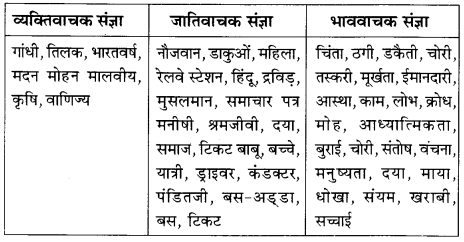
We hope the NCERT Solutions for Class 8 Hindi Vasant Chapter 7 क्या निराश हुआ जाए help you. If you have any query regarding NCERT Solutions for Class 8 Hindi Vasant Chapter 7 क्या निराश हुआ जाए, drop a comment below and we will get back to you at the earliest.
